Yves here. I suspect the results of this study on CEOs won’t be all that surprising, but it’s good to have data, as opposed to guesses or isolated observations.
By Alma Cohen, Professor of Empirical Practice, Harvard Law School and Associate Professor, Tel-Aviv Department of Economics; Moshe Hazan, Associate Professor of Economics, Tel-Aviv University; Roberto Tallarita, Associate Director and Research Fellow, Program on Corporate Governance, Harvard Law School; and
David Weiss, Assistant Professor, Tel-Aviv University. Originally published at VoxEU
With power over corporate resources as well as stature and prestige in the economic system, public-company CEOs to have sizeable influence over policy and political decisions. This column examines the political donations of more than 3,800 US CEOs of S&P 1500 companies to analyse their political preferences over time, across industries and geographical regions, and by gender. It shows that US public company CEOs have a significant preference for Republicans, who may benefit from public companies’ expanded freedom to spend money on politics.
CEOs of public companies preside over a significant portion of the American economy. Their power over corporate resources, as well as their stature and prestige in the economic system, enable public-company CEOs to have sizeable influence over policy and political decisions.
In the famous 2010 case of Citizens United versus Federal Election Commission, the US Supreme Court allowed corporations to make unlimited independent political expenditures. This created an enormous potential for corporations to influence elections and policymaking. Under the current laws, however, shareholders have little or no say in how these political expenditures are made (Bebchuk and Jackson 2010). Management, and CEOs in particular, decide which political candidates the corporation will support.
Furthermore, CEOs have acquired an important role in the policy discourse. They are active and influential participants in the policy debate (Chatterji and Toffel 2018); they often act as nonpartisan advisers to US presidents and policymakers (Gara 2016, Meyersohn 2017); and they are directly (and successfully) involved in policy advocacy through their most prominent association, the Business Roundtable, which was established in 1972 for the explicit purpose of formulating and advocating policy views.
For these reasons, we believe that public-company CEOs have significant influence over policy and political decisions and that understanding the political preferences of CEOs is valuable to comprehend the inner dynamics of US policymaking and politics. In a new paper (Cohen et al. 2019), we study the political preferences of CEOs and how they change over time, across industries and geographical regions, and based on CEO gender.
An Empirical Study of CEOs’ Political Preferences
To study the political preferences of CEOs, we analyse political donations of more than 3,800 individuals who served as CEOs of an S&P 1500 and information on corporate CEOs contained in ExecuComp to compile a comprehensive database of S&P 1500 CEO political donations. Our matching algorithm relies on first, middle, and last names and the distance of the donor’s home address from the company headquarters. As a result of this process, we have data on the political contributions of 3,810 CEOs over 18 years.
To identify the political preferences of CEOs, we measure the extent to which contributions given by any CEO ultimately benefit Republican or Democratic candidates. This analysis is simple. Contributions are generally made to political committees and while some of these committees have a clear affiliation with a political party or a candidate within that party, many do not. If a CEO donates to an unaffiliated committee, we measure how this committee spends its funds and attribute this spending to the CEO.
We define a CEO’s political preference in a given year based on an examination of the CEO’s political contributions during the four years that precede, and the three years that follow, that given year. Thus, we calculate for each CEO the fraction of their contributions going to each of the two main parties during this eight-year period. Basing our analysis on a time window that is somewhat shorter or longer would result in qualitatively similar results.
CEO Partisan Preferences
Our study finds that public-company CEOs consistently prefer Republican candidates. Most CEOs donate to both Democrats and Republicans. However, even for CEOs who donate to both parties, how they split the contributions between the two parties can display partisan preferences.
Figure 1 shows the full probability distribution of partisan preferences in CEO donations. We refer to a CEO as supporting a main party if the fraction of contributions by the CEO to that party exceeds a certain fraction of the total contributions made by that CEO. If neither donations to Republicans nor those to Democrats exceed the threshold, the CEO is classified as ‘neutral’.
Figure 1 Probability distribution of CEO partisan preferences
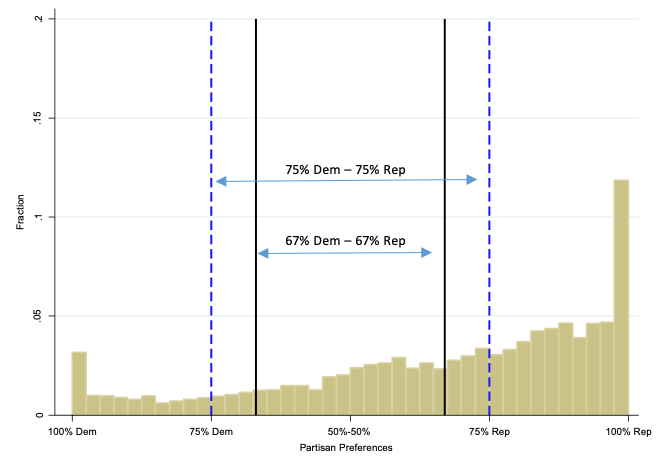
The middle of the x-axis in Figure 1 represents perfectly balanced preferences (50% of contributions to Democrats and 50% to Republicans). The extreme left end represents CEOs directing 100% of their contributions to Democratic candidates; the extreme right end represents CEOs directing 100% of their contributions to Republican candidates; intermediate points represent intermediate mixes of preferences.
Republican-leaning CEOs are about three times as many as Democratic-leaning CEOs, regardless of whether we classify the political preferences of CEOs based on a threshold of 60%, 67%, or 75% of the total donations.
Given the tendency of CEOs to support Republicans, it is natural to ask how this pattern looks over time. Figure 2 displays the partition of CEOs between Republicans, Democrats, and neutral, for each year during the period 2000-2017 for the full S&P 1500 sample. The figure shows that, notwithstanding some fluctuations in the Republicans/Democrats ratio, Republican CEOs significantly outnumbered Democratic CEOs at every point in time.
Figure 2 CEO political preferences for the S&P 1500 – changes over time
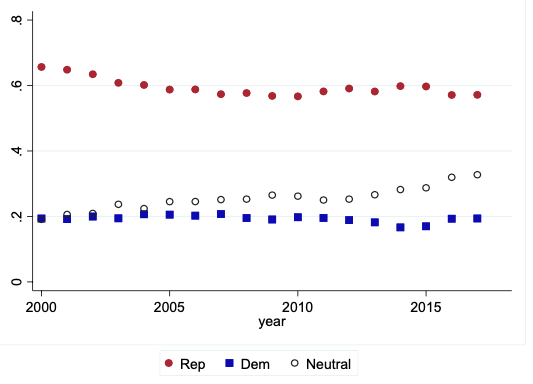
We next delve further into this Republican preference and study CEO political preferences by industry. We use the Fama-French industry classification that divides public companies into 12 industry sectors. Table 1 shows the results. The table indicates that the percentage of Republican CEOs significantly exceeds the percentage of Democratic CEOs in each industry sector.
However, the magnitude of the pro-Republican imbalance greatly varies across industries. The industry with the strongest pro-Republican tilt is energy; in this industry, 89.1% of CEOs favour Republican candidates while only 4.7% favour Democrats, which results in a Republicans/Democrats ratio of 19. Only two industries—business equipment and telecoms—have a Republicans/Democrats ratio below 2. In these two industries, however, Republican CEOs still outnumber Democrats significantly: 48.6% Republicans versus 30.2% Democrats for business equipment; and 37.1% Republicans versus 22.8% Democrats for telecoms.
Table 1 CEO political preferences by industry
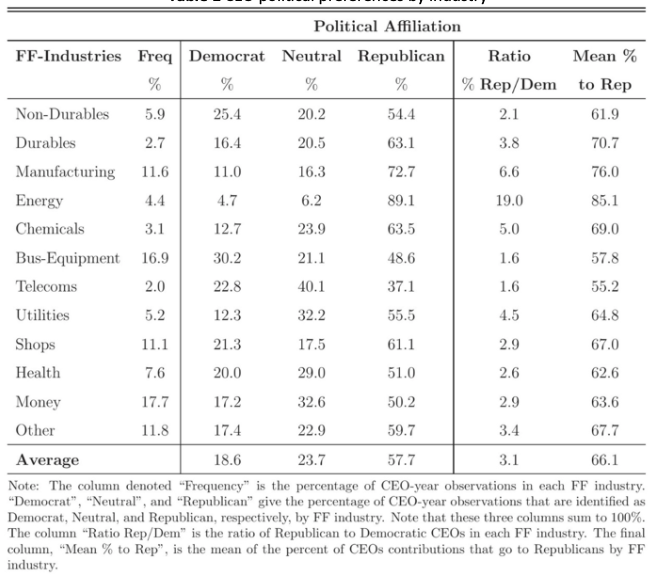
While all industries exhibit a Republican bias, Table 2 examines whether male and female CEOs display different political preferences during the period 2000-2017. While male Republican CEOs are more than three times as numerous as male Democratic CEOs, the fraction of female Republican CEOs is only slightly larger than that of female Democratic CEOs, with a ratio of only 1.1. Furthermore, Republican CEOs are 58.3% of male CEOs, but only 34.3% of female CEOs.
Table 2 CEO political preferences by gender
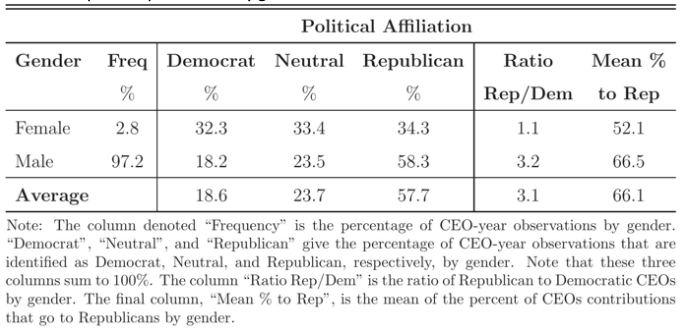
Not all companies are equal, with market capitalisation ranging greatly. For all groups of market capitalisation, Republicans outnumber Democratic CEOs by at least a ratio of 1.6. The results can be seen in Table 3. The companies in our dataset had an aggregate market capitalisation of about $21 trillion as of the end of 2017. Out of this aggregate value, companies headed by Republican CEOs had an aggregate market capitalisation of $8.3 trillion (39%), whereas companies headed by Democratic CEOs had an aggregate market capitalisation of only $4.8 trillion (about 23%), and companies headed by neutral CEOs had an aggregate market capitalisation of $8 trillion (about 38%). Thus, Republican CEOs control 70% more market capitalisation than Democratic CEOs.
Table 3 Aggregate market cap by CEO political preferences, 2017
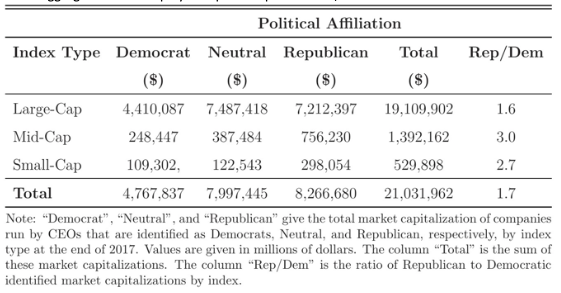
CEO Politics and Corporate Political Transparency
Finally, we use the CPA-Zicklin Index score (CZI score) as a metric to measure the quality of corporate disclosure on political contributions and to test whether there is a statistical relationship between the political preferences of CEOs and their companies’ quality of political spending disclosure. We study the total CZI score as well as its three sub-scores for disclosure, oversight, and policy.
We find that having a Republican CEO is associated with a lower CZI score, that is, less transparency on the company’s political spending. The effects are not only statistically significant but also of a meaningful size. Having a Republican CEO is associated with a reduction of 6.9 percentage points in the CZI score. This reduction is meaningful, given that the average value of the CZI score was 42.1%.
Policy Implications
Our study documents how public-company CEOs have a significant preference for Republican candidates. These findings provide useful insights about the potential spending patterns of public companies and imply that, to the extent that public companies would over time take substantial advantage of the expanded freedom to spend money on politics established by Citizens United, Republicans could disproportionately benefit from this freedom.
The data also cautions against the characterisation of CEO committees or CEO associations as politically neutral or nonpartisan. Although policy and political positions should be assessed on their merits, regardless of the identity or political leanings of their advocates, the frequent characterisation of CEO groups and committees as bipartisan or politically balanced might be misleading for many people. In fact, our findings show that public-company CEOs disproportionately display pro-Republican preferences.
These findings should inform the public discourse as the debate over corporate America’s role in campaign finance continues.
See original post for references


What, no Democratic Socialists among them?
I’ll leave this here as an example of the sort of candidate CEOs do not prefer.
https://berniesanders.com/anti-endorsements/
Well yes, but why exclude private company CEOs? No data?
First, unless they were previously public, very hard to know how big they are, and even PE owned private companies are way smaller on average than S&P 500 companies and thus almost certainly smaller political donors.
Second, PE owned company managers are widely believed to do what their PE bosses tell them to do, including regarding political contributions.
Some companies, including one of my former employers, encouraged officers to donate to its Political Action Committee (PAC) with those contributions based on title. We were told that anyone with any questions was free to come discuss that with the President.
Thanks…
Of course the Dems, rather than saying “ok screw this we are gonna go a different way with fundraising (cough, $27, cough)” can’t help themselves, just have to try to be more like Republicans. “Hey, there are gay CEO’s and a smattering of females, so ID Pol will get them!!”.
But of course rich people are above any “out group” stigmatization, so they vote their pocketbooks. Or use their pocketbooks to get the vote they want, which isn’t Democrats.
Now despite all this and probably worst of all, Trump managed to way underspend Clinton, so like most things, past a certain point all additional cash is wasted. If 1/2 a billion dollars She wasted on Her Turn was spread around the Midwest a bit, it would still allow Her to outspend Trump and yet might have flipped a surprising number of seats. Ah well.
It’s why when CEOs hate a particular candidate, it is a good reason to vote for them.
The class interests of the CEOs of the largest companies is clearly aligned with the super rich, and against the common citizen.
We need a 95 percent rate or higher top marginal tax rate again and a ban on CEO campaign contributions along with their indirect influence such as lobbying.
They are using their massive wealth to manipulate any semblance of democracy to enrich themselves at our expense.
“Furthermore, CEOs have acquired an important role in the policy discourse. They are active and influential participants in the policy debate (Chatterji and Toffel 2018); they often act as nonpartisan advisers to US presidents and policymakers (Gara 2016, Meyersohn 2017); and they are directly (and successfully) involved in policy advocacy through their most prominent association, the Business Roundtable, which was established in 1972 for the explicit purpose of formulating and advocating policy views.”
Indeed, but we can go further. Corporations increasingly write legislation directly, which members of congress often don’t even bother to have their staffers read. Directly writing legislation: influence indeed!! https://publicintegrity.org/state-politics/copy-paste-legislate/you-elected-them-to-write-new-laws-theyre-letting-corporations-do-it-instead/
And it should be mentioned that Citizens United also probably opened the floodgates for foreign corporations to influence policy – although there are no hard numbers because so much of this is in so-called ‘dark money’ that either can’t be investigated, or simply isn’t. But as likely the tip of the iceberg, Wanhua Chemical joined the American Chemical Society lobbying group. Although given how little US-flagged corporations seem to care about their own nation, perhaps this is less of an issue than one might at first have thought…
A couple of things trouble me about this post. Are the results in table 2 indicating political preference by gender backed out of the data indicating have a significant preference for Republicans? Table 2 indicates CEOs are 97% men, often white men I thought, and I also thought men as a group and white men particularly tend to have a preference for Republicans.
If I put myself into the shoes of a CEO and wear my Machiavelli hat I think would put my money wherever I thought it might benefit my bottom line and ease of doing business — as in give me free rein to do whatever I please. I think the by industry figures bear out my guess at how CEOs would operate — I regard the Bus-Equipment, Telecom, and Health numbers as evidence. I think the especially strong preferences for Republicans in the Manufacturing and Energy sectors also tend to support my interpretation of CEO preference behavior. I think CEOs put their political contributions into the party kitty where they expect to get the high ROI. I suspect the party in power in the middle of the two President cycle might receive more funds and in cases where the election outcome is uncertain I suspect CEOs support both parties in whatever split seems to reduce their risk of having no pull on the winner.
I also wonder at some of the categories like Other, Shops, and Durables versus Non-Durables. Is the MIC part Manufacturing or Durables? What about Google, Amazon, Apple, Microsoft? Are they Non-Durables? This raises a question about another source bias in this study. I had the impression several big players have thrown in with one party or the other in recent past. Weren’t the Money sector and Health sectors especially generous to Obama when he was POTUS. And doesn’t the MIC tend to back whichever party has a War Hawk as its candidate, weighted by that candidate’s ability to win the election? In some cases owning the winning party may cost too much if all that’s needed is sufficient ownership of the opposition party to assure that undesirable policies are blocked.
This study seems to assume there is more difference between the parties than the past behaviors of the parties would support. No matter which party wins the public can be sure the public’s interests will not be allowed interfere with Corporate Interests. The policy contests end up contests between competing Corporate Interests battling for their place in extracting rents from the public. Neither party supports the public interests with more than lip service. Any candidates that show signs of supporting the public, end up like Henry Wallace, or Robert Kennedy.
Both parties are right wing, and they’re the only real choices an American has.
Hopefully Bernie changes that, but until then this study is not helpful.
The crushing ratio of energy industry CEOs favoring Republicans makes it extremely depressing that Democrats do nothing on climate change or renewable energy. They gain nothing by supporting pipelines and attacking land/water protectors.
Thank you once again, both Naked Capital and the esteemed commentariat, for adding to my understanding of business, economics, politics and their various intersections in America.
While I’m more distressed and depressed than ever about the chances of our country righting its wrongs and becoming more representative of the majority of its citizens, I do appreciate seeing the, err, naked truth.
I’m more in favor than ever before of the proposal that our politicians, like NASCAR drivers, at least be required to wear emblems of their sponsors. It would make the situation much less confusing!